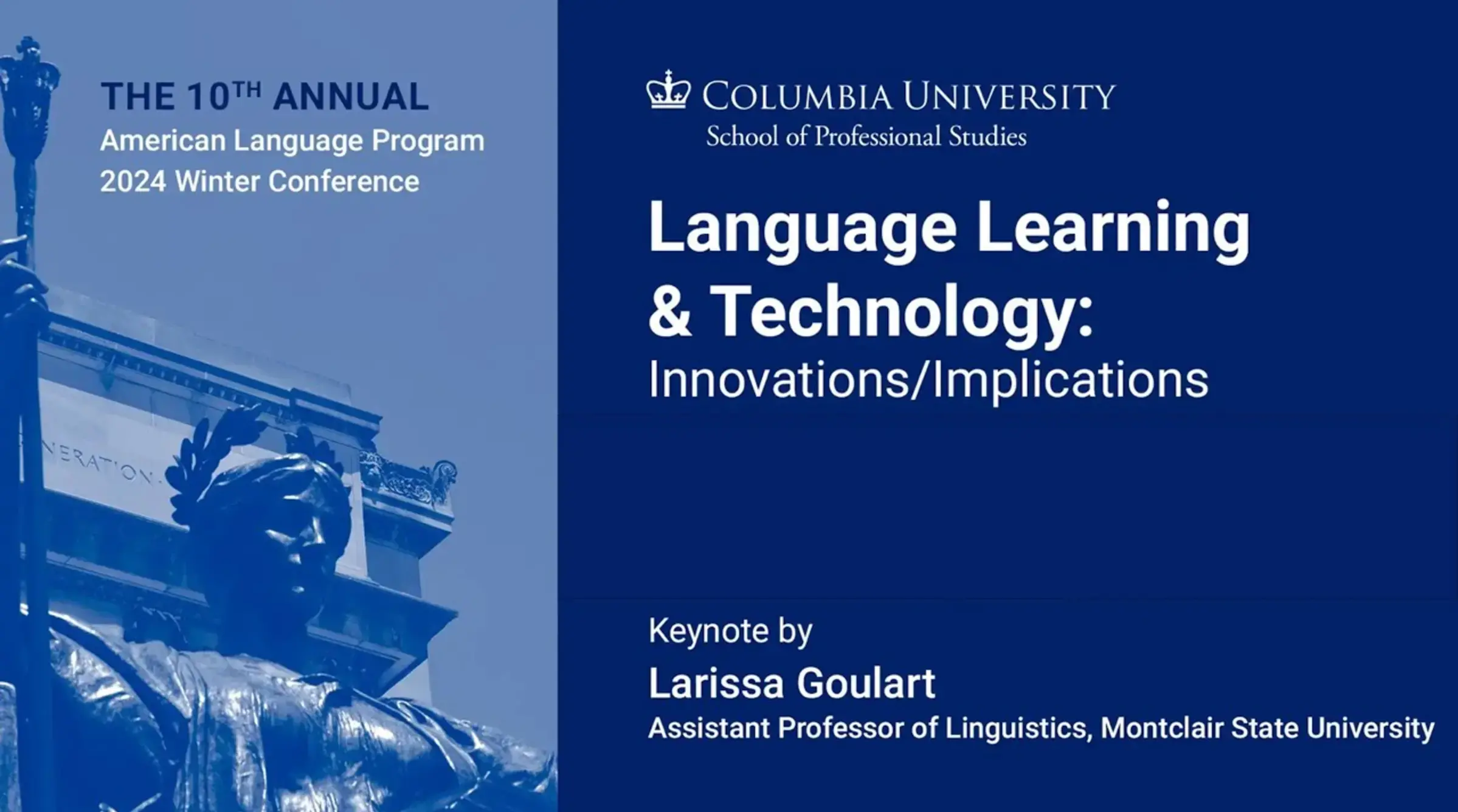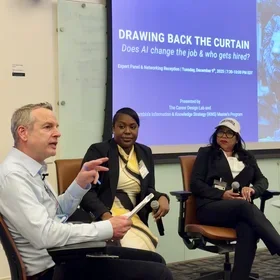A simple phrase used in a writing assignment that Larissa Goulart, assistant professor of linguistics at Montclair State University, inspired her to lay the groundwork for the day-long 2024 American Language Program (ALP) Winter Conference Language Learning & Technology: Innovations/Implications that took place on February 17. A student of hers, whose first language wasn't English, used the phrase “tasty irony” in a written assignment.
She said it wasn’t incorrect, but to someone who grew up speaking English—or at least American English—it could sound like a bungling of the common descriptor “delicious irony.” One of the responsibilities of an English teacher, she noted, is giving students the tools to make subtle choices in the words they use.
Such distinctions are easier to analyze today than they were decades ago. She works with databases of texts—that is, definable sets of writings, such as in young adult fiction, academic articles, or Taylor Swift lyrics—to analyze trends in the uses of common words. A simple example, she said, is to look at the context of the word “gay” in texts from the 1950s as opposed to today. That information can help students understand the nuances of the language.
“Maybe I’m killing the next Shakespeare just because it’s their second language,” she said with a laugh. But the objective is to help them craft the language, for specific or poetic purposes.
"English remains an important global language, and for over 100 years, the ALP [in the Columbia University School of Professional Studies] has helped students from all over the world achieve their language learning goals and achieve professional, academic or personal success," said Mary Pickett, director of ALP, after the conference. "The ALP Winter Conference began ten years ago as a way to share the vast wealth of faculty knowledge with the wider English language teaching community in the tri-state area."
This year, the conference focused on artificial intelligence and digital teaching tools, with sessions on using artificial intelligence, video production, and other new technologies as teaching tools.
"With the advent of readily available and popular AI, technology use in language learning and teaching has presented both challenges and exciting opportunities,” explained senior lecturer Brittany Ober, one of the conference coordinators. “We wanted to provide a space for educators to present, listen to, and discuss the theoretical issues and practical applications of various types of technology—including ChatGPT, corpus linguistics, and remote learning—for various language learning contexts."
Two afternoon sessions addressed the effectiveness of online teaching tools available on the market.
Dolores Barbazán Capeáns and Leyre Alejaldre Biel, both lecturers in Spanish in Columbia’s department of Latin American and Iberian Cultures, said they had tried a variety of language learning apps with their students and had found they can be effective in promoting review and practice at home. They noted that none of the apps seemed to help improve grades, but they might help in long-term language retention.
A survey of available AI-enhanced teaching tools presented by Daryl Perkins, an ESL specialist with Irvington Public Schools in New Jersey, showed that learning apps can adapt to individual needs and offer real-time learning data, but that there are several challenges implicit in introducing apps for home learning. In particular, there may be access disparity when students don’t have internet or an available device at home, and introducing such tools may saddle a district with privacy concerns.
Of course, artificial intelligence will continue to evolve, and according to Babi Kruchin, a lecturer in the American Language Program, instructors need to start using it to help shape it.
However, she added that using AI to develop quizzes and teaching materials must be done cautiously. “We don’t really know what’s going on [with AI], and we don’t know what we’re going to get,” she said.
In her presentation, Kruchin introduced what she calls the BBB model: brain, bot, and then brain again. A teacher can have an idea and use AI to develop it into a lesson plan, but they need to use their brain again to analyze the results.
It’s an “exercise in creativity,” she said. “Let’s have fun with it.”
About the Program
The American Language Program, founded in 1911, is one of the oldest English language programs in the United States. Their mission is to provide rigorous English language education that supports the academic, professional and personal goals of our student community, while promoting critical thinking and intercultural awareness.



